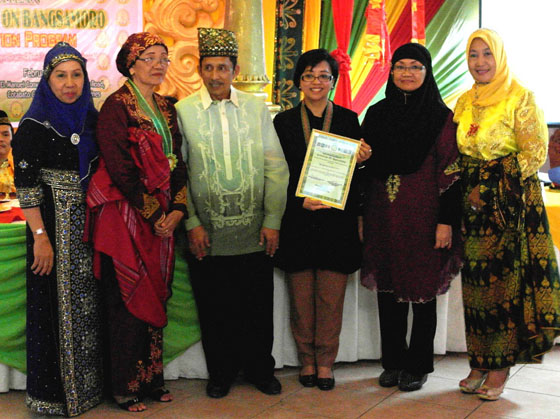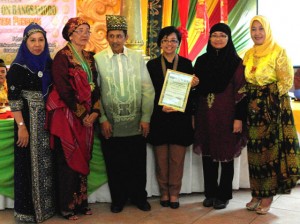
A government photo shows Miriam Ferrer (center) who heads the peace panel, receives a certificate of appreciation for speaking at a forum on the Framework Agreement on the Bangsamoro organized recently by the Maharadjah Tabunaway Descendants Council of the Philippines in Cotabato City. Also in the photo are (from left) Hadja Bai Putri Marieta Nor-Aisha Mindalano, Hadja Bai Bing Bacar, Datu Abdullah Adam,Hadja Bai Cabaybay Abubakar; and Hadja Bai Sittie Rahma Calugtiao.
COTABATO CITY – Peace negotiator Miriam Ferrer has encouraged traditional leaders of royal houses in the South to come up with a paper on how they envision their roles and further contribute to building peace in the future of a new Bangsamoro region.
“Magandang input kung ano ho ba talaga ang role ninyo na pamumunuan ninyo mismo,” Ferrer told leaders of a royal clan in Maguindanao called the Maharadjah Tabunaway Descendants Council of the Philippines who organized a peace forum on the Framework Agreement on the Bangsamoro in Cotabato City.
Some 200 participants attended the forum that brought together the Royal Houses of Rajah Buayan; Maguindanao; Dungun in Tawi-Tawi; Sibugay in Zamboanga del Sur; Kapatagan Valley in Lanao del Norte; and Kabuntalan.
“Traditional leaders and royal houses can play a role in the FAB by participating in the consultations that will be conducted by the Transition Commission in drafting the Bangsamoro Basic Law,” she said.
The Bangsamoro accord was signed by the Aquino government and Moro Islamic Liberation Front last October and serves as the road map for the creation of a new political entity that will replace the current Autonomous Region in Muslim Mindanao.
Hadja Bai Putri Marieta Nor-Aisha Mindalano, who heads the MTDCP, stressed the importance of the gathering. “We gathered here to promote peace and accelerate the role of royal house because achieving peace is everyone’s responsibility,” she said.
Traditional leaders of royal Houses cited the importance of preserving customary laws and enhancing its usage as a source or reference to the administration of justice and promotion of peace and order in the Bangsamoro.
Explaining its significance, Mindanlano said: “Customary law has been part of our Bangsamoro system of life that provided for maintenance of peace and welfare in our communities. It can define how traditional cultural heritage is shared, developed, and appropriately sustained within a community. It can also define rights and responsibilities of every community members on important aspects of their life and culture.”
She said they recently signed a manifesto and submitted it to the peace panels where they expressed “hope that the Bangsamoro Basic Law that will be drafted by the Transition Commission will consider preserving the historic existence and the role of the royal houses and the traditional leaders in the establishment of the Bangsamoro government.
Hadja Bai Cabaybay Abubakar, who is also a leader of MTDCP, said that the peace process, particularly the developments on the FAB, is being followed by the Bangsamoro people.“The FAB is a manifestation that the parties are committed to end the war. The challenge is for people to come together for the success of the FAB,” she said.
MILF representative Nurudin Salam, on the other hand, expressed his gratitude to President Aquino for his commitment to implement the FAB within his term. “We are very thankful to the FAB which recognized the Bangsamoro.”
On the same note, 6th Infantry Division spokesman Col. Dickson Hermoso, who was also present in the forum, thanked the royal house for its support in pushing for peace in Mindanao, and the Aquino administration for putting the peace process a priority. “We thank President Aquino whose concern is peace and development which can be achieved if we all cooperate,” he said.
MTDCP is composed of members who belong to the same clan who traced their descent from Radjah Tabunaway and his brother Radjah Mamalu who led the Rajadom or royal leaders in Maguindanao during the pre-colonial period.
According to the organization, Shariff Mohammad Kabunsuan, who was said to be the first Islamic missionary who came to the Philippines, was welcomed by Tabunaway who was the ruler in Maguindanao. With consent, the people converted to Islam and began adopting the Sultanates system of leadership. In the process, Tabunaway conferred Shariff Kabunsuan the honorary title of sultan.
Mamalu, on the other hand, chose to practice indigenous beliefs and moved upland. Non-Muslim indigenous peoples now called the Lumad thus trace their ancestry to Mamalu while the traditional rulers who adopted Islam revere Tabunaway. Both brothers swore to live together in peace and to always help each other, a message that continues to resonate today.

